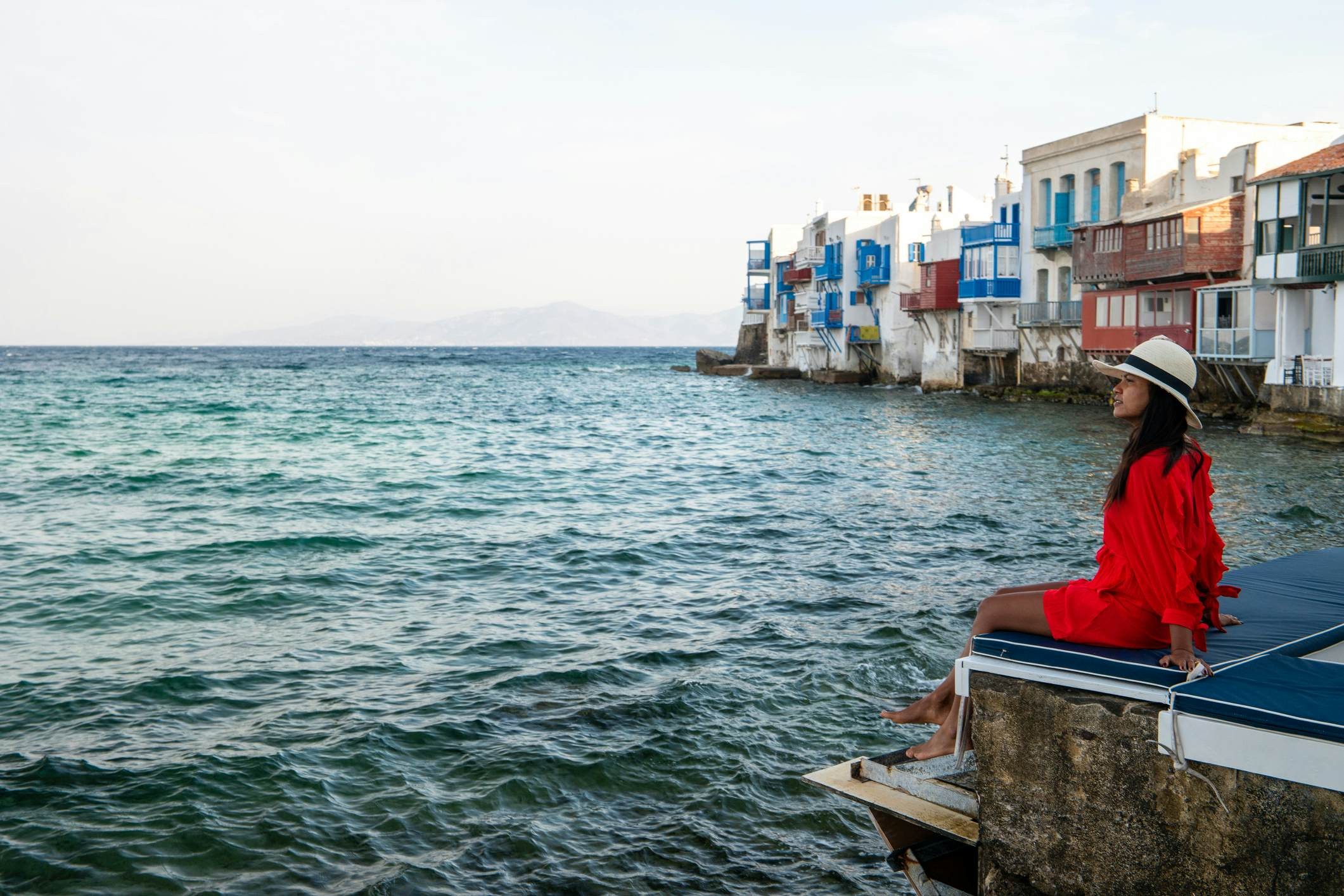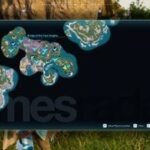Planning a trip to Greece? What To Know Before Traveling To Greece involves understanding the best time to visit, choosing the right islands, and navigating local customs for an unforgettable experience. TRAVELS.EDU.VN is here to ensure your Greek adventure is seamless, offering insider tips and expert advice. Discover the allure of ancient ruins, the beauty of sun-kissed beaches, and the warmth of Greek hospitality with confidence.
1. Best Time To Visit Greece: Seasonal Insights
Greece offers diverse experiences throughout the year. Understanding the seasonal nuances is key to planning your perfect trip.
1.1. Summer (June – August): Peak Season
Summer is Greece’s most popular season. Ideal for beach lovers and those seeking vibrant nightlife.
- Pros: Warmest weather, perfect for swimming and sunbathing. Long daylight hours for extended exploration. Numerous festivals and events.
- Cons: Highest prices, crowded attractions, and intense heat, especially in inland areas.
1.2. Shoulder Seasons (April – May & September – October): Ideal Balance
The shoulder seasons provide a sweet spot with pleasant weather and fewer crowds.
- Pros: Mild temperatures, ideal for sightseeing and outdoor activities. Lower prices and fewer tourists. Opportunities to experience local life more authentically.
- Cons: Some seasonal businesses may have limited hours or be closed. The sea might be too cold for swimming in early spring and late autumn.
1.3. Winter (November – March): Budget-Friendly Retreat
Winter offers a unique perspective on Greece, with a focus on cultural experiences and serene landscapes.
- Pros: Lowest prices on accommodations and flights. Fewer tourists, allowing for intimate exploration of historical sites. Opportunities to experience authentic Greek culture and traditions.
- Cons: Colder temperatures, rain, and shorter daylight hours. Many tourist-oriented businesses are closed. Ferry schedules are reduced, limiting island hopping.
| Season | Weather | Crowds | Prices | Activities |
|---|---|---|---|---|
| Summer | Hot and sunny | High | Highest | Beach activities, swimming, nightlife, festivals |
| Shoulder Season | Mild and pleasant | Moderate | Moderate | Sightseeing, hiking, exploring, cultural events |
| Winter | Cold and rainy | Low | Lowest | Visiting historical sites, experiencing local culture, budget travel |
2. Defining Your Greek Wishlist: Tailoring Your Itinerary
Greece has a dizzying array of options, tailor your trip to match your interests.
2.1. Cultural and Historical Immersion
For history buffs, focus on mainland Greece and islands like Crete and Rhodes. Explore ancient ruins, museums, and archaeological sites.
- Key Sites: Acropolis (Athens), Delphi, Olympia, Knossos (Crete), Ancient Rhodes.
- Activities: Guided tours, museum visits, archaeological excavations.
2.2. Island Hopping and Beach Relaxation
If relaxation is a priority, choose islands known for their beautiful beaches and crystal-clear waters.
- Popular Islands: Santorini, Mykonos, Crete, Rhodes, Corfu, Zakynthos.
- Activities: Swimming, sunbathing, water sports, boat tours, exploring hidden coves.
2.3. Adventure and Outdoor Activities
Explore the diverse landscapes of Greece through hiking, rock climbing, and water sports.
- Destinations: Samaria Gorge (Crete), Meteora, Vikos Gorge (Epirus).
- Activities: Hiking, rock climbing, canyoning, rafting, windsurfing, kitesurfing.
2.4. Food and Wine Experiences
Indulge in the rich culinary traditions of Greece, from traditional tavernas to wine-tasting tours.
- Regions: Crete, Santorini, Peloponnese, Thessaloniki.
- Activities: Cooking classes, wine tours, olive oil tasting, visiting local markets.
3. Discovering the Perfect Greek Island or Region: A Detailed Guide
Each island and region offers a unique flavor. Find the perfect match for your travel style.
3.1. The Cyclades: Iconic Beauty
Known for their whitewashed villages, blue-domed churches, and stunning sunsets.
- Santorini: Famous for its caldera views, luxury accommodations, and romantic ambiance.
- Mykonos: Renowned for its vibrant nightlife, beautiful beaches, and cosmopolitan atmosphere.
- Paros: Offers a blend of beautiful beaches, traditional villages, and water sports opportunities.
- Naxos: The largest of the Cyclades, with diverse landscapes, sandy beaches, and rich history.
- Amorgos: A tranquil island with dramatic cliffs, hiking trails, and a laid-back atmosphere.
3.2. The Dodecanese: History and Beaches
A group of islands with a rich history and diverse landscapes, blending Byzantine, medieval, and Ottoman influences.
- Rhodes: Boasts a medieval city, beautiful beaches, and historical sites.
- Kos: Known for its sandy beaches, ancient ruins, and cycling routes.
- Karpathos: Offers a rugged landscape, traditional villages, and windsurfing opportunities.
- Patmos: A spiritual island with a serene atmosphere and the Monastery of Saint John the Theologian.
3.3. The Ionian Islands: Lush Greenery
Characterized by their lush vegetation, turquoise waters, and Venetian architecture.
- Corfu: Boasts a blend of beautiful beaches, historic sites, and lush landscapes.
- Zakynthos: Famous for its stunning beaches, including Navagio (Shipwreck) Beach.
- Kefalonia: The largest of the Ionian Islands, with diverse landscapes and charming villages.
- Lefkada: Known for its turquoise waters, windsurfing opportunities, and picturesque villages.
3.4. Crete: A World Unto Itself
The largest Greek island, with diverse landscapes, rich history, and unique culture.
- Highlights: Knossos, Samaria Gorge, Elafonisi Beach, Chania Town.
- Activities: Hiking, exploring archaeological sites, relaxing on beautiful beaches, indulging in local cuisine.
3.5. The Peloponnese: Ancient Wonders
A region on the Greek mainland with a rich history, ancient ruins, and diverse landscapes.
- Key Sites: Olympia, Mycenae, Epidaurus, Mystras.
- Activities: Exploring archaeological sites, hiking, visiting traditional villages, relaxing on beautiful beaches.
 Santorini Greece, caldera view with white buildings and blue domes under bright sunlight
Santorini Greece, caldera view with white buildings and blue domes under bright sunlight
4. Transportation Hubs: Beyond Athens
While Athens is a common entry point, consider other airports for convenience.
4.1. Athens International Airport (ATH)
The largest and busiest airport in Greece, with connections to numerous international destinations.
- Pros: Wide range of flight options, direct connections to major cities worldwide, efficient public transportation to Athens city center.
- Cons: Can be crowded during peak season, potential for delays.
4.2. Thessaloniki Airport (SKG)
The second-largest airport in Greece, serving Northern Greece and the Halkidiki peninsula.
- Pros: Convenient access to Thessaloniki and surrounding areas, less crowded than Athens airport.
- Cons: Fewer international flight options compared to Athens.
4.3. Island Airports
Several major islands have international airports, including Mykonos, Santorini, Corfu, and Rhodes.
- Pros: Direct access to popular island destinations, saving time and money on domestic flights or ferries.
- Cons: Limited flight options, may be more expensive than flying to Athens or Thessaloniki.
| Airport | Location | Destinations Served | Pros | Cons |
|---|---|---|---|---|
| Athens International (ATH) | Athens | Numerous international and domestic destinations | Wide range of flight options, efficient public transportation | Can be crowded, potential for delays |
| Thessaloniki (SKG) | Thessaloniki | Northern Greece and Halkidiki peninsula | Convenient access to Thessaloniki, less crowded than Athens | Fewer international flight options |
| Mykonos (JMK) | Mykonos | Popular island destination | Direct access to Mykonos, saving time and money | Limited flight options, may be more expensive |
| Santorini (JTR) | Santorini | Popular island destination | Direct access to Santorini, saving time and money | Limited flight options, may be more expensive |
| Corfu (CFU) | Corfu | Popular island destination | Direct access to Corfu, saving time and money | Limited flight options, may be more expensive |
| Rhodes (RHO) | Rhodes | Popular island destination | Direct access to Rhodes, saving time and money | Limited flight options, may be more expensive |
5. Advance Booking: Essential During Peak Season
Secure your preferred accommodations, transportation, and activities by booking in advance.
5.1. Accommodations
Book hotels, apartments, and villas well in advance, especially for popular destinations like Santorini and Mykonos.
- Tip: Consider booking directly with the hotel or property owner for better deals and more flexibility.
5.2. Transportation
Reserve rental cars, ferry tickets, and domestic flights in advance to avoid disappointment.
- Tip: Ferry schedules can change, so check the latest updates before your trip.
5.3. Activities and Tours
Book popular tours, excursions, and activities in advance to guarantee your spot.
- Tip: Look for online discounts and package deals.
6. Navigating Greek Roads: Tips for Confident Drivers
Driving in Greece can be an adventure. Be prepared for winding roads and local driving habits.
6.1. Road Conditions
While the road network has improved, some roads can be narrow, winding, and poorly maintained.
- Tip: Drive cautiously and be prepared for unexpected obstacles.
6.2. Driving Habits
Greek drivers can be assertive and may not always follow traffic rules.
- Tip: Be aware of your surroundings and drive defensively.
6.3. Car Rental
Book your rental car in advance, especially during peak season.
- Tip: Consider renting a smaller car for easier maneuverability on narrow roads.
6.4. Ferry Services
Regular car-ferry services connect the mainland with most islands.
- Tip: Book your ferry tickets in advance, especially during peak season.
7. Accessibility Considerations: Planning for All Travelers
While Athens offers improved accessibility, much of Greece remains challenging for travelers with disabilities.
7.1. Accessible Accommodations
Search for hotels and apartments with accessible features, such as ramps, elevators, and adapted bathrooms.
- Tip: Contact the accommodation directly to confirm accessibility details.
7.2. Accessible Transportation
Public transportation in Greece is generally not very accessible.
- Tip: Consider hiring a private accessible taxi or arranging for accessible transportation services.
7.3. Accessible Sites and Attractions
Research which sites and attractions offer accessible access.
- Tip: Contact the site or attraction in advance to inquire about accessibility features.
8. Packing Essentials: Clothing and Gear
Pack appropriately for the Greek climate and activities.
8.1. Clothing
Lightweight, breathable clothing is essential for the warm Greek summers.
- Tip: Pack quick-drying fabrics and versatile pieces that can be dressed up or down.
8.2. Footwear
Sturdy walking shoes are a must for exploring historical sites and cobbled streets.
- Tip: Bring comfortable sandals or flip-flops for the beach.
8.3. Sun Protection
Protect yourself from the strong Greek sun with sunscreen, a hat, and sunglasses.
- Tip: Choose a high SPF sunscreen and reapply frequently.
8.4. Swimwear
Pack your swimsuit for enjoying the beautiful Greek beaches and swimming pools.
- Tip: Bring a beach towel and a cover-up for modesty.
9. Essential Greek Phrases: Connecting with Locals
Learning a few basic Greek phrases will enhance your travel experience.
9.1. Greetings
- Hello: Γεια σας (Ya sas)
- Good morning: Καλημέρα (Kalimera)
- Good evening: Καλησπέρα (Kalispera)
- Goodbye: Αντίο (Antio)
9.2. Politeness
- Please: Παρακαλώ (Parakalo)
- Thank you: Ευχαριστώ (Efharisto)
- You’re welcome: Παρακαλώ (Parakalo)
- Excuse me: Συγγνώμη (Signomi)
9.3. Basic Communication
- Yes: Ναι (Ne)
- No: Όχι (Ohi)
- I don’t understand: Δεν καταλαβαίνω (Den katalaveno)
- Do you speak English?: Μιλάτε Αγγλικά; (Milate Anglika;)
10. Currency and Payments: Cash vs. Card
Greece uses the Euro (€). While credit cards are widely accepted, it’s always a good idea to carry some cash.
10.1. ATMs
ATMs are available in most towns and tourist areas.
- Tip: Be aware that ATMs on the islands may occasionally lose their connection.
10.2. Credit Cards
Credit cards are accepted in most hotels, restaurants, and shops.
- Tip: Check with smaller establishments to confirm if they accept credit cards.
10.3. Tipping
A service charge is usually included in restaurant bills.
- Tip: Rounding up the bill or leaving a small tip is appreciated for good service.
11. Travel Insurance: Protecting Your Trip
Comprehensive travel insurance is essential for peace of mind.
11.1. Medical Coverage
Ensure your policy covers medical expenses, including hospitalization and medication.
- Tip: Check if your policy covers pre-existing conditions.
11.2. Trip Cancellation and Interruption
Choose a policy that covers trip cancellation and interruption due to unforeseen circumstances.
- Tip: Review the policy terms and conditions carefully.
11.3. Lost or Stolen Belongings
Ensure your policy covers lost or stolen belongings, including luggage, electronics, and travel documents.
- Tip: Keep a copy of your travel insurance policy with you.
12. Staying Safe and Healthy: Hydration and Sun Protection
Greece can be very hot, especially during the summer months. Stay hydrated and protect yourself from the sun.
12.1. Hydration
Drink plenty of water throughout the day.
- Tip: Tap water may not be safe to drink on some islands, so stick to bottled water.
12.2. Sun Protection
Apply sunscreen liberally and wear a hat and sunglasses.
- Tip: Seek shade during the hottest part of the day.
12.3. Mosquitoes
Mosquitoes can be a nuisance, especially in the evenings.
- Tip: Pack insect repellent and wear long sleeves and pants.
13. Safety Precautions: Protecting Yourself from Petty Crime
Be aware of your surroundings and take precautions to protect yourself from petty crime.
13.1. Pickpocketing
Pickpocketing is common in crowded areas, such as markets and public transportation.
- Tip: Keep your valuables close to you and be aware of your surroundings.
13.2. Theft
Theft can occur on beaches and in other tourist areas.
- Tip: Don’t leave your belongings unattended.
13.3. Taxi Scams
Some taxi drivers may try to overcharge tourists.
- Tip: Make sure the meter is running or negotiate the price before you get in.
FAQ: Frequently Asked Questions About Traveling to Greece
14.1. What is the best time of year to visit Greece?
The best time to visit Greece is during the shoulder seasons (April-May and September-October) for pleasant weather and fewer crowds.
14.2. What should I pack for a trip to Greece?
Pack lightweight clothing, sturdy walking shoes, sunscreen, a hat, sunglasses, and a swimsuit.
14.3. Is it safe to drink tap water in Greece?
Tap water may not be safe to drink on some islands, so stick to bottled water.
14.4. What is the currency used in Greece?
Greece uses the Euro (€).
14.5. Are credit cards widely accepted in Greece?
Credit cards are widely accepted in most hotels, restaurants, and shops, but it’s always a good idea to carry some cash.
14.6. Do I need a visa to travel to Greece?
Greece is part of the Schengen Area, so visa requirements depend on your nationality. Check the latest visa requirements before your trip.
14.7. What are some must-see attractions in Greece?
Must-see attractions include the Acropolis in Athens, Santorini’s caldera, Mykonos’ beaches, and the ancient ruins of Delphi and Olympia.
14.8. What are some popular Greek dishes?
Popular Greek dishes include moussaka, souvlaki, gyros, and fresh seafood.
14.9. How do I get around in Greece?
You can get around in Greece by plane, ferry, bus, or rental car.
14.10. What should I do in case of an emergency?
In case of an emergency, dial 112 for assistance.
 Acropolis Athens, illuminated at night, showing the ancient architecture and historical significance
Acropolis Athens, illuminated at night, showing the ancient architecture and historical significance
Planning a trip to Greece can be exciting and overwhelming. TRAVELS.EDU.VN aims to simplify the process, offering tailored advice and insider tips to ensure a seamless and memorable experience. Contact us today at 123 Main St, Napa, CA 94559, United States, or call +1 (707) 257-5400 for personalized travel planning. Visit our website at TRAVELS.EDU.VN and let us help you create the Greek adventure of your dreams. Let travels.edu.vn handle the details so you can focus on creating unforgettable memories. Don’t wait, contact us now and start planning your Greek getaway today.
